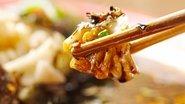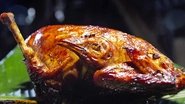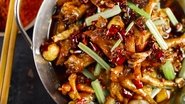
Food
Chinese food culture has distinctive features and displays unique values. Food has been integral to our culture for thousands of years. Chinese people perceive and grasp the world around them through food. This episode will highlight the human factor in food, focusing on the relationship between people and food. Regardless of family survival or clan glory, food constitutes the foundation of our cultural existence. Only those who work hard can make delicious food. We find the true meaning of life from food.
Country: CN
Language: Zh
Runtime: 50
Season 3:

Water and soil on one side and people on the other. China's rich natural resources have brought a variety of unique snack categories. These foods are often made from local materials, are the most friendly, can best reflect local characteristics, and are also the most evocative. They have a prominent position and strong vitality in Chinese food culture. Snacks condense the customs of a place and become a unique local folk symbol, reflecting the local material and social life style.

Chinese people are used to turning joys, sorrows and joys in life, weddings and funerals, and socializing into eating activities. As the so-called "reciprocity of etiquette" improves the relationship between people, the style of banquets and parties has greatly developed. People closely connect diet and social interaction, and the matter of diet is devoted to the expectation of family harmony, state governance, and world peace. Through banquets, people not only enjoy the art of food, but also enhance affinity and achieve harmony.

The Chinese use diet to maintain health, have developed a unique system of botany, medicine, and nutrition, and created health-preserving delicacies with natural philosophy. Food nourishes righteousness, and the common ingredients that are readily available contain the mysteries of health, guarding the road to the physical and mental safety of the Chinese nation. Discuss nutrition, hope to help everyone build a healthier lifestyle

Chinese food culture has distinctive features and displays unique values. Food has been integral to our culture for thousands of years. Chinese people perceive and grasp the world around them through food. This episode will highlight the human factor in food, focusing on the relationship between people and food. Regardless of family survival or clan glory, food constitutes the foundation of our cultural existence. Only those who work hard can make delicious food. We find the true meaning of life from food.

Dim sum is an important part of Chinese cooking, known for its long history, excellent production, rich variety and changeable flavor. People love to eat dim sum because they are not only delicious, but also entrust the Chinese people's yearning and expectation for a better life. A large number of Chinese pastries are still an indispensable gift for the Chinese people to communicate with each other. It is like a mirror, reflecting the changes of the times and human etiquette. It can be said that dim sum accompanies people through the festivals throughout the year, and also witnesses the growth and perfection of every life. It entrusts happiness and carries the spirit of love and mutual assistance.

Everything in the world changes with the seasons, and China's agricultural work also follows the rhythm of nature. The world's intangible cultural heritage "Twenty-Four Solar Terms" is a unique system used by the Chinese to guide farming and life, and it is also the embodiment of Chinese food culture and life wisdom. To this day, the Chinese continue to maintain their physical and mental health with solar terms and diets. They follow the weather, plowing in spring, cultivating in summer, harvesting in autumn, and storing in winter.

In the history of China, the North-South exchanges, multi-ethnic integration, East-West convergence... The unique historical evolution has always been an important driving force for the fusion and evolution of food culture. The migration of people brings about the renewal of food, showing the vitality that travels through time and space. Advances in technology today have driven unprecedented changes in the world. The new changes on the dining table are also proof of the trend of the times. This episode focuses on China's population migration and how it affects the eating habits of Chinese people today. In what ways do these foods affect and change people's tastes and temperaments?



